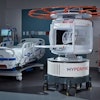Dear MRI Insider,
One of radiology's great benefits is its ability to provide reliable predictions of future outcomes in patients who exhibit early signs of certain characteristics.
Researchers from the University of California, San Francisco (UCSF) are using such a strategy to help determine who might be at risk for joint degradation due to osteoarthritis and other musculoskeletal conditions. Their recent study investigated a potential link between baseline MRI signal abnormalities in knee cartilage and future cartilage degeneration.
Read more about the paper and its findings in our Insider Exclusive.
Speaking of prognostications, cardiac MRI can help predict the risk for serious cardiovascular events better than SPECT, regardless of a person's risk factors, angiography results, or initial treatment. Researchers in the U.K. concluded that cardiovascular MRI is a "robust alternative" to SPECT for predicting patient outcome in terms of major adverse cardiac events, adding "further weight to the growing evidence base for cardiovascular MRI in the diagnosis and management of patients with suspected coronary heart disease."
Also in the U.K., Perspectum Diagnostics, a start-up company spun off from Oxford University, is preparing to unveil a new software application designed to cut down on unnecessary invasive liver biopsies. The firm's LiverMultiScan software uses quantitative MRI parameters to determine which patients should be sent on for additional workup.
In addition, a new MRI-based 3D software technique is able to capture and quantify changes to the prostate after focal laser ablation therapy. The software could provide better management of prostate cancer patients after laser ablation therapy.
Meanwhile, researchers in Washington, DC, have developed a functional MRI (fMRI) technique that reveals what could be a valuable biomarker to evaluate brain function in boys with autism spectrum disorder. The fMRI approach targets oxygen levels and oxygen utilization across different brain regions to identify areas of activity, or lack thereof, when children with autism spectrum disorder are given a certain task.
Finally, a former Facebook executive wants to change the radiology landscape by developing miniaturized MRI technology that could be distributed at low cost.
Be sure to visit the MRI Community at AuntMinnie.com on a daily basis for the latest news and groundbreaking research from around the world.



.fFmgij6Hin.png?auto=compress%2Cformat&fit=crop&h=100&q=70&w=100)




.fFmgij6Hin.png?auto=compress%2Cformat&fit=crop&h=167&q=70&w=250)











